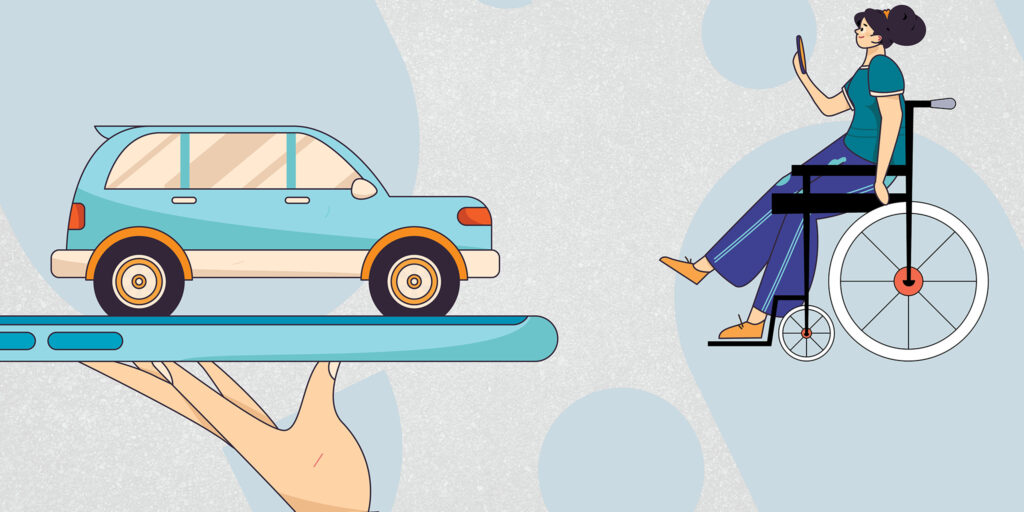
WAV Taxis and Rideshares Open Doors for Inclusive Transportation
By Matt Alderton | Friday, May 23, 2025
5 Second Summary
Does the ADA apply to rideshare and taxi services? How can you find a wheelchair-accessible ride? Transportation and advocacy experts answer these questions and more.
They say you can get anything in New York City — and that includes wheelchair-accessible vehicles (WAVs) through taxi companies and rideshare apps. Uber’s and Lyft’s New York fleets include WAVs that enable people with disabilities to get a ride on demand, just as many other busy commuters do.

Aaron Marks’ law firm is representing disability rights organizations in a class-action lawsuit over lack of accessible rideshares.
However, this ridesharing access is not common, according to New York-based attorney and disability rights advocate Aaron Marks. Aaron is an associate in the antitrust practice of Cohen Milstein, a plaintiff-side law firm representing disability rights organizations in a class-action lawsuit over rideshare companies’ lack of services for disabled passengers.
“There are jurisdictions and cities that have taken the initiative to force rideshare companies to stop blocking wheelchair users from their services, and New York City is one of them,” Aaron says. “We see in those jurisdictions that WAVs are available to people who need them.”
Accessible taxis and rideshares don’t exist everywhere. In cities like New York where they do, however, they’re a powerful reminder of the fundamental rights guaranteed by the Americans with Disabilities Act (ADA) and the opportunities that unfold when people with disabilities have the same access to transportation as their non-disabled friends and neighbors.
Your rights and protections
“It’s difficult to imagine something more important to participating in public life than access to transportation,” Aaron says. “Despite all the advances that have been made in remote work and remote connection, people still need to be able to get from one place to another. When they’re prohibited from traveling within their community on the basis of having a disability, it meaningfully affects all facets of their life, including their ability to access work, groceries, social gatherings, religious ceremonies, and civic engagement like elections.”
More than 18 million Americans have a travel-limiting disability, according to the Bureau of Transportation Statistics’ 2022 National Household Travel Survey. If you’re one of them, you should know that Titles II and III of the ADA guarantee equal access to transportation. Title II protects people with disabilities from discrimination in public transportation and guarantees them equal access to public transit systems. Title III forbids discrimination by private transportation providers like taxi companies, and advocates are currently litigating the extent to which the law requires them to operate WAVs.
When the ADA was enacted in 1990, Uber and Lyft didn’t exist, and it’s not yet clear whether the ADA’s protections extend to rideshares. Disability rights advocates argue that rideshare companies are transportation providers. Rideshare services say they are technology companies whose core business is mobile apps instead of motor vehicles. They also claim there’s not enough demand for WAVs to justify the cost of acquiring and operating them.

Joel Cartner is MDA’s Director of Access Policy.
“If rideshare companies are transportation companies, then they are to some extent offering a public service, and to the extent that they’re offering a public service, they need to be in compliance with the ADA,” says Joel Cartner, Director of Access Policy at MDA. “If they’re tech companies, then they aren’t providing a public service; they’re just providing a window into the ridesharing world and aren’t required to be in the same amount of compliance with ADA.”
Although multiple lawsuits have been brought over this issue, there has not been a decisive court ruling. How courts eventually rule could impact the availability of WAVs on ridesharing apps nationwide.
But accessibility isn’t just about WAVs. Another important issue is service animals. On that question, the ADA is clear.
“Service animals have full access to all public spaces and services,” Joel says. “Obviously, that doesn’t stop people from breaking the law — a driver could still pull up, see your service animal, and drive away — but if you’re wondering whether you have legal recourse on that matter, the answer is yes. Absolutely.”
A patchwork of regulations
Until the courts determine how the ADA applies to rideshare companies, they are subject to local regulations. Therefore, geography determines your ability to hail an accessible ride via Uber, Lyft, or one of the new services emerging in some areas, such as Via, Revel, or Curb.
“Right now, there is a patchwork of local and state regulations, which leads to varying outcomes for people depending on where they happen to live,” Aaron says. “Somebody living in one city may have access to WAVs in their ridesharing app, but they could move to an apartment building across the street and no longer have access to the same vehicles because now they’re living in a different city. It’s an inconsistent experience.”
The best way to find out if WAVs are available in your area is to check your rideshare app. Uber and Lyft both list several cities where they officially provide WAV service, but user experience varies.
Follow this process to check for WAV service in your area:
- Uber: Open the app, choose your destination, and select “WAV” from the list of available ride options.
- Lyft: Open the app, go to “Settings” and toggle on “wheelchair access.” Then, you can input your destination and select “Wheelchair” from the list of available rides.

Shannon Wood is MDA’s Director of Disability Policy.
Of course, just because a service is available doesn’t mean it works perfectly. “Even in the larger cities where they’re available, it can be difficult to locate an accessible vehicle at the moment you want it,” says Shannon Wood, MDA’s Director of Disability Policy.
That’s because the ability to hail a ride depends on how many WAV drivers are on the road at any given moment. Sometimes, wait times are long — or a WAV might not be available at all. Joel emphasizes the importance of planning ahead. “Try to request a ride at least 24 hours in advance because the pools for accessible rides still aren’t big,” he says. “They’re getting bigger, but they’re not there yet in terms of providing a rapid response.”
It’s worth noting that taxis have many of the same challenges with availability and wait times. Because they’ve been around longer, taxi companies are more likely to have WAVs in their fleets than rideshare companies, but the availability is still limited.
“On the bright side, it’s a market that’s growing a lot,” Joel says. Increased demand for accessible rides should lead to increased supply.
Positive policies
The cities where Uber and Lyft offer WAVs are models for what’s possible in communities nationwide. By passing laws requiring WAVs or creating incentives for companies to offer more, they’ve successfully moved the needle toward increased mobility and independence for all. Here are a few examples of policies that have made a positive difference for passengers with disabilities:
- New York City requires rideshare companies to either dispatch 25% of their trips to WAVs or fulfill 90% of WAV requests in under 10 minutes. In 2023, it also lifted a policy limiting the number of licenses it would grant to rideshare vehicles operating in the city; it now issues an unlimited number of licenses as long as new vehicles are either electric or wheelchair accessible.
- San Francisco mandates that rideshare companies offer WAVs in their apps and report how many WAV requests they fulfill. It also establishes an incentive for more WAVs by requiring rideshare companies to pay a fee on every ride they give. Companies that can show they’re increasing WAV access on their platforms are refunded the fees.
- Chicago requires rideshare companies to create and implement accessibility plans to operate in the city. It also offers rideshare companies $30 per trip for WAV rides as an incentive for maintaining WAV service.
- Boston’s Massachusetts Bay Transportation Authority (MBTA) partnered with Uber and Lyft to furnish on-demand rides to users of its paratransit service, The RIDE. Paratransit riders who sign up can book a WAV using their smartphone; they pay a $3 co-pay for each trip, and MBTA subsidizes the rest of the fare, up to $40.
Some cities likewise mandate and incentivize WAVs for taxi companies. Chicago, for instance, pays up to $25,000 to taxi medallion owners to subsidize the cost of converting their standard taxi into a WAV and up to $35,000 to subsidize the purchase of a new, factory-built WAV. In Washington, DC, taxi companies with fleets of 20 vehicles or more must dedicate at least 20% of their fleets to WAVs.
What you can do
While local actions are helpful, what’s most needed is regulation on a national scale. “Some jurisdictions have taken the initiative and the positive step of opening up WAV access to people who need it, and it’s been successful. But ultimately, those jurisdictions only control what happens in their boundaries,” Aaron says. “As advocates, what we’ve been pushing for is enforcement of the law nationally so rideshare companies are required to stop blocking wheelchair users from their platforms across the country.”
Members of the neuromuscular community can do their part to catalyze change locally and nationally by speaking up when they experience discrimination in transportation and demanding that rideshare and taxi services in their areas offer WAVs.
“It’s important to understand that you have rights as a rideshare consumer with a disability,” Shannon says. “If you feel you’ve been discriminated against, you can file a complaint with Uber, Lyft, or whatever company you’re using.”
You can also seek support from your state’s protection and advocacy agency (find a state protection agency) or file a complaint with the US Department of Justice (file a complaint).
“It can be frustrating because companies will often just give you a refund for your ride instead of making real, structural changes,” Shannon continues. “But even so, it’s important to file those complaints.”
Aaron agrees: “The squeaky wheel gets the grease. If people speak out and continue to speak out, then eventually change will come.”
Matt Alderton is a Chicago-based freelance writer who frequently covers health topics.
Next Steps and Useful Resources
- Gain practical tips for overcoming transportation barriers and learn about laws and protections with MDA’s no-cost Access Workshop: Access to Travel and Transportation.
- Read about Using Public Transit With a Disability and find more transportation resources.
- Stay up-to-date on Quest content! Subscribe to Quest Magazine and Newsletter.
Disclaimer: No content on this site should ever be used as a substitute for direct medical advice from your doctor or other qualified clinician.




